General and vital information.
According
to the United States Census Bureau 80% of U.S. homes have some form of
air conditioning. With the advent of global climate change, more homes
will require air conditioning, and more air conditioners will succumb to
the mechanical strain imposed on them by such.
I couldn't find reliable statistics, but my guess is that about 85% of homes with air conditioning are still running R-22 refrigerant systems. All window unit air conditioners are running on R-22 refrigerant, as the new, more efficient, and environmentally friendly R-410a refrigerant hasn't been used in production of window units as of yet.
International legislation was passed years ago in order to phase out refrigerant twenty two systems, and It's worrisome how few homeowners have been educated about what this will mean to them. Fewer still have budgeted for the change. I'm hoping to provide some basic information to aid in decision making should you require major air conditioning repairs for your home this Summer.
I couldn't find reliable statistics, but my guess is that about 85% of homes with air conditioning are still running R-22 refrigerant systems. All window unit air conditioners are running on R-22 refrigerant, as the new, more efficient, and environmentally friendly R-410a refrigerant hasn't been used in production of window units as of yet.
International legislation was passed years ago in order to phase out refrigerant twenty two systems, and It's worrisome how few homeowners have been educated about what this will mean to them. Fewer still have budgeted for the change. I'm hoping to provide some basic information to aid in decision making should you require major air conditioning repairs for your home this Summer.
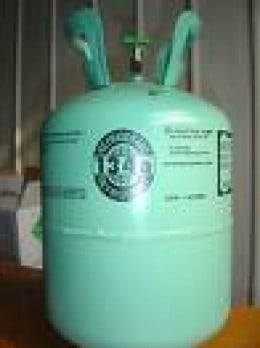
A thirty pound jug of refrigerant twenty two
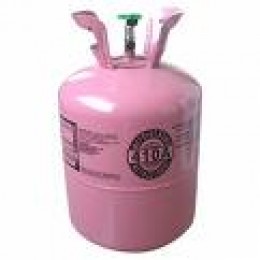
This jug is r410, but there's less of it, and more jug-because of higher pressures
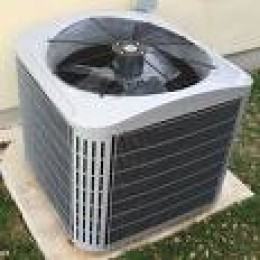
A modern condenser
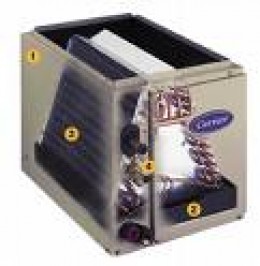
This is a view of a modern evaporator coil. This style of coil is known as an "A" coil
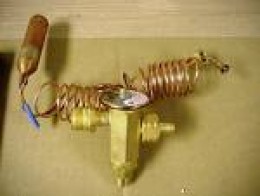
This is a metering device known as a thermostatic metering device
Home Air Conditioning Spring Tune Up Checklist
- Springtime Home Air Conditioning Tune Up Checklist.
This is a very comprehensive checklist covering more than just the basics of what a Spring tune up service should entail. This is a guide for both homeowners and technicians alike.
Protecting Your Home's Air Conditioner During Home Improvements.
- Protecting your air conditioner during home improvements.
Having work done to improve the performance and value of your home can sometimes be deadly to your home's air conditioning equipment. A homeowner should never assume that a contractor or crew of other trades understands air conditioning in the least
What's happened, and what to do.
January
2010 was the end of production of hvac equipment using R-22. The reason
for this is that refrigerant 22 is a chlorofluorocarbon, containing
chlorine, which can damage the ozone layer. Refrigerant 22 will still be
in production until 2020, in order to service existing equipment. The
price of R-22, however, is skyrocketing.
Refrigerant 22 has a replacement, of course, and it's replacement, R-410a, is a superior refrigerant in a couple of different ways. R-410a became available around the year 2000, but people were skeptical, and rightfully so; and besides, they had time. . . . .
Chances are your home air conditioning system uses R-22, even if you had it installed last year. The reason for this is that R-22 systems were available at a lower price, but in the long run-the cost for those systems will be higher for you, the home owner.
Take a look at the two pictures I've uploaded that appear to be jugs of something-the green jug is R-22, and below it, the pink jug, is R-410a. I included those pics so that should you have seen, or visited with your HVAC installer or service technician the last time that he was in your home(or outside of it, at the condenser)-you may recognize one of those, or both of those refrigerant jugs.
Take a look now at the third picture down, which is a picture of a condenser. If you've personally seen a technician or contractor with a pink jug attached to some hoses out by your condenser; then good for you-your concern here is pretty much over. You've got a system using the new, more efficient, and environmentally friendly refrigerant 410a. Simply maintain your equipment; and enjoy your Summer.
I'm here to deal with people with systems that are using R-22. If you know for certain that your home's central air conditioning system used R-22, guess what? Your going to have to replace some equipment at some point, and if your equipment fails sooner rather than later; then I highly suggest you make the switch to new equipment, and R-410a.
Your R-22 condenser can not, and will not function with R-410a. It won't happen. They do not mix. They do not work together, and they never will. Should your condenser fail, then don't take the cheaper way out by getting another R-22 condenser, that's just putting off the inevitable. Sure, R-22 condensers are still available; but they won't be for long, and should your system leak. . . .!!!!$$$$
Leaks: Most major refrigerant leaks take place in the systems evaporator coil. The fourth picture down is a pic of a typical, modern evaporator coil. It's nearly impossible to find and repair leaks in an evaporator coil. It's almost never cost effective to try. If you've got an R-22 system with a leaking evaporator coil, then I'll tell you right now, it's nearly impossible to find an R-22 evaporator coil now, and the costs of the ones out there are double, or more, what they were this time last Summer.
If your R-22 system evaporator coil is leaking-you need to buy a new R-410a condenser, and a matching R-410a evaporator coil. There's no easy way around it. However, if your R-22 condenser fails, but your R-22 evaporator coil is still sound-then you will be okay by simply replacing your condenser to a new R-410a condenser, and having the Thermostatic Expansion Valve on your evaporator coil replaced to match the new condenser. The final picture is an example of a thermostatic expansion valve.
What's the good news? Is there any? Of course there is! The new systems running refrigerant 410a are more efficient. The new refrigerant has greater enthalpy, which means that it can transfer more heat from inside your home to the ambient air outside. That means your electric bill should drop when you finally do bite the bullet and get a modern system. Also, with the new refrigerant, you can give ol' Al Gore a high five; and tell him you appreciate the stress he's caused you. Tell Al I said, "hello."
I know this was long, full of technical stuff that you probably aren't interested in, but I hope to be helpful if I can. Feel free to ask any questions should you have them.
Refrigerant 22 has a replacement, of course, and it's replacement, R-410a, is a superior refrigerant in a couple of different ways. R-410a became available around the year 2000, but people were skeptical, and rightfully so; and besides, they had time. . . . .
Chances are your home air conditioning system uses R-22, even if you had it installed last year. The reason for this is that R-22 systems were available at a lower price, but in the long run-the cost for those systems will be higher for you, the home owner.
Take a look at the two pictures I've uploaded that appear to be jugs of something-the green jug is R-22, and below it, the pink jug, is R-410a. I included those pics so that should you have seen, or visited with your HVAC installer or service technician the last time that he was in your home(or outside of it, at the condenser)-you may recognize one of those, or both of those refrigerant jugs.
Take a look now at the third picture down, which is a picture of a condenser. If you've personally seen a technician or contractor with a pink jug attached to some hoses out by your condenser; then good for you-your concern here is pretty much over. You've got a system using the new, more efficient, and environmentally friendly refrigerant 410a. Simply maintain your equipment; and enjoy your Summer.
I'm here to deal with people with systems that are using R-22. If you know for certain that your home's central air conditioning system used R-22, guess what? Your going to have to replace some equipment at some point, and if your equipment fails sooner rather than later; then I highly suggest you make the switch to new equipment, and R-410a.
Your R-22 condenser can not, and will not function with R-410a. It won't happen. They do not mix. They do not work together, and they never will. Should your condenser fail, then don't take the cheaper way out by getting another R-22 condenser, that's just putting off the inevitable. Sure, R-22 condensers are still available; but they won't be for long, and should your system leak. . . .!!!!$$$$
Leaks: Most major refrigerant leaks take place in the systems evaporator coil. The fourth picture down is a pic of a typical, modern evaporator coil. It's nearly impossible to find and repair leaks in an evaporator coil. It's almost never cost effective to try. If you've got an R-22 system with a leaking evaporator coil, then I'll tell you right now, it's nearly impossible to find an R-22 evaporator coil now, and the costs of the ones out there are double, or more, what they were this time last Summer.
If your R-22 system evaporator coil is leaking-you need to buy a new R-410a condenser, and a matching R-410a evaporator coil. There's no easy way around it. However, if your R-22 condenser fails, but your R-22 evaporator coil is still sound-then you will be okay by simply replacing your condenser to a new R-410a condenser, and having the Thermostatic Expansion Valve on your evaporator coil replaced to match the new condenser. The final picture is an example of a thermostatic expansion valve.
What's the good news? Is there any? Of course there is! The new systems running refrigerant 410a are more efficient. The new refrigerant has greater enthalpy, which means that it can transfer more heat from inside your home to the ambient air outside. That means your electric bill should drop when you finally do bite the bullet and get a modern system. Also, with the new refrigerant, you can give ol' Al Gore a high five; and tell him you appreciate the stress he's caused you. Tell Al I said, "hello."
I know this was long, full of technical stuff that you probably aren't interested in, but I hope to be helpful if I can. Feel free to ask any questions should you have them.

0 comments:
Post a Comment